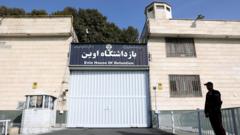In the early hours of June 24, a cease-fire between Iran and Israel was announced, coinciding with missile strikes and retaliatory actions that heightened tensions.
Iran and Israel Announce Cease-Fire Following Escalating Conflict

Iran and Israel Announce Cease-Fire Following Escalating Conflict
President Trump confirms a cease-fire agreement while military actions continue to unfold in the region.
Article Text:
In a tense twist to ongoing hostilities in the region, Iranian state television confirmed a cease-fire between Iran and Israel this morning, following an announcement by President Trump. Reports indicate that while Iran sought to de-escalate, it had continued missile strikes against Israeli targets. As of early morning, Israeli forces were still responding with their own missile attacks on Iranian positions, highlighting the complexity of cease-fire agreements.
The recent escalation saw Iran launching missiles at Al Udeid Air Base in Qatar, the largest U.S. military base in the region, reportedly in retaliation for American air strikes on its nuclear facilities. Notably, Iran provided advance notice of this attack, signaling a potential willingness to retreat from further hostilities.
In a statement on social media, President Trump emphasized that while a complete cease-fire had been agreed upon, the halt in military actions would take place in phases as both nations "wound down" ongoing missions. The situation remains fluid, with military exchanges likely continuing until a formal cessation can be enforced.
The geopolitical ramifications of these developments have already begun to unfold, with oil prices experiencing a decline and global stock markets reacting positively to the news of the cease-fire announcement. Meanwhile, the U.S. State Department has issued alerts for Americans abroad, reflecting concerns about safety given the heightened tensions.
As the situation continues to evolve, many are left wondering what implications this cease-fire will have for both countries and the broader stability of the Middle East.
In a tense twist to ongoing hostilities in the region, Iranian state television confirmed a cease-fire between Iran and Israel this morning, following an announcement by President Trump. Reports indicate that while Iran sought to de-escalate, it had continued missile strikes against Israeli targets. As of early morning, Israeli forces were still responding with their own missile attacks on Iranian positions, highlighting the complexity of cease-fire agreements.
The recent escalation saw Iran launching missiles at Al Udeid Air Base in Qatar, the largest U.S. military base in the region, reportedly in retaliation for American air strikes on its nuclear facilities. Notably, Iran provided advance notice of this attack, signaling a potential willingness to retreat from further hostilities.
In a statement on social media, President Trump emphasized that while a complete cease-fire had been agreed upon, the halt in military actions would take place in phases as both nations "wound down" ongoing missions. The situation remains fluid, with military exchanges likely continuing until a formal cessation can be enforced.
The geopolitical ramifications of these developments have already begun to unfold, with oil prices experiencing a decline and global stock markets reacting positively to the news of the cease-fire announcement. Meanwhile, the U.S. State Department has issued alerts for Americans abroad, reflecting concerns about safety given the heightened tensions.
As the situation continues to evolve, many are left wondering what implications this cease-fire will have for both countries and the broader stability of the Middle East.




















